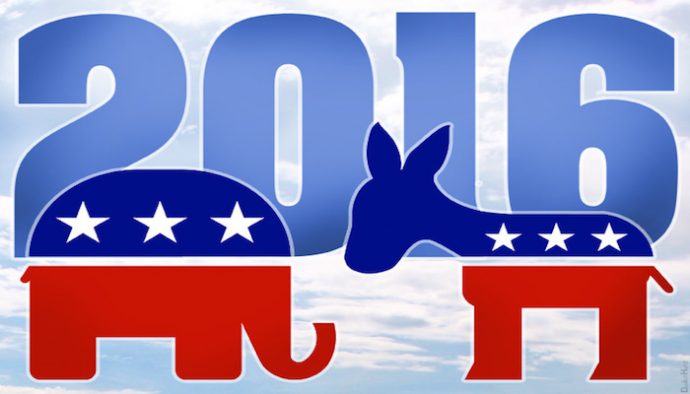When I was a kid, I remember watching presidential debates. I don’t remember enjoying them, but I remember watching them. At first, I watched as an assignment from one of my classes in school. But then as I grew into my middle teenage years, I was influenced by some people who saw great importance in civic duty, especially for the Christian, and so I began to watch voluntarily. Again, I watched, but I didn’t necessarily enjoy.
I never thought, in the midst of what seemed like to a young man tedious deliberation over the finer points of policy that I could not yet understand how related to me, that as a father someday I would tell my children they could not watch a presidential debate because the content would likely be inappropriate for them. And yet that’s exactly what I did.
It points, then, to a great dilemma I’m facing as a parent, who is a Christian. The dilemma is how do I rightly talk to my children about this election? How do I educate and disciple these little hearts and minds in the midst of what has become to me something very shameful? I suppose we could, as parents, take the same tactic we might take with certain movies, video games, or TV shows. We point out the reasons why the content is inappropriate for our family right now and then simply find another age appropriate alternative.
But that doesn’t feel right. This is too important, and the lessons here need to be imparted to the next generation, lest we find ourselves in the same place we are in now.
In light of that, here are five conversations you might consider having with your children in light of this election.
1. The conversation of pragmatism versus morality.
Many have come, I believe, to view this election in very, very pragmatic terms. The Supreme Court is at stake. The rights of the unborn are at stake. Global security are at stake. And when you strictly view something like an election exclusively through that lens, you can easily come down to the point that the ends justify the means, no matter how difficult those means might be to accept. But pragmatism does not exist in a vacuum. It cannot, at least for the Christian, for we believe that only in eternity will all things be set right.
If that’s true, then pragmatism must be weighed against morality. In that dichotomy, what is right does not always “work” and what “works” is not always right. Our children must come to understand that not just in this election, but in all of life, there will be this tension between what is most right and what is most effective. And God help us, we must help our children see that what is right should win in our own hearts at least.
2. The conversation of the sovereignty of God and the authority of humans.
We are not the first generation of God’s people to wring our hands at those who are in authority over us, and we won’t be the last. I can imagine that the deported children of Israel, the persecuted Christians of the Roman Empire, and the house churches under Communism have all had their own doubts and fears. And yet it’s from these very sources, both in Scripture and out of it, where we find the exhortations to trust in the sovereignty of God in all things. One of the primary ways we display that trust is to honor those whom God, in His wisdom, has seen fit to place in positions of power, however briefly they might sit there.
God still sets up kings and deposes them just as He did in the days of Daniel and the days of Peter and Paul. One of the striking differences between our day and those, however, is that this same sovereign God has seen fit to put us in a position whereby we actually play an active role in electing these officials instead of simply existing under the rule that has been passed down from one to another. Nevertheless, the principle holds true – that regardless of what happens on November 8, we will all be called to respect, so far as it is possible, on November 9. Our children should see this modeled in us and be prepared themselves.
3. The conversation of true citizenship versus citizenship of the world.
If nothing else, one good thing that will come from these days is a reminder to the children of God that this world is not our home. We are citizens of another kingdom – a greater kingdom – one in which the question of justice and rights and grace and decency has already been answered. We are living out the very sentiment of Ecclesiastes in these days, in which we cry out “Vanity! Vanity!” when we look with distaste on what is occurring around us. And, like the Teacher in that book, our frustration ought to push us further into the reality that everything – and everyone – will disappoint us except for God.
With our children, then, this is a fresh moment to remind them that we are true citizens of God’s kingdom. That this kingdom is where we put our ultimate stock and hope, and when we do, we realize that things like elections are of great importance, but they are not of utmost importance.
4. The conversation about the true state of the world.
A great many of us have the luxury of living mainly insulated lives. We are insulated by our homes, our insurance, and our 401K’s. And many of our children also live in this kind of bubble, where we have, with the best of intentions, tried to create a safe place for them to grow and thrive. One of the drawbacks, though, of those best of intentions is that we can raise children who are shocked when they finally find their way into the real world. This election is an opportunity to have a conversation about the true state of the world, not the carefully designed and curated one most of us live in.
That’s because these candidates are, actually, a reflection of who we are as a people. We are those who are determined to live as our own gods, even if it means redefining the very fabric of what it means to be human at all. Or else we are those bent on our own self-preservation we are willing to pledge any allegiance necessary in order to protect what we perceive to be the way of life we are entitled to, no matter who gets in the way. As frightening as it is, these candidates are the world. This is a conversation in which we can help our kids understand the nature of sin, and how we are called to stand in opposition to it.
5. The conversation about the necessity of engagement.
Edmond Burke is credited as saying, “The only thing necessary for the triumph of evil is for good men to do nothing.” This election provides an opportunity to help our children understand the cost of doing nothing. There is a great temptation here and now to do just that – to batten down the hatches, to idly sit back, and to trust the course of history to what will be. Even some who believe in the sovereignty of God in all things have argued that this is the appropriate stance to have. And yet we know that the sovereignty of God does not compel us to inactivity; instead, it moves us to active engagement. For who can say what the sovereign means God has designed to bring about common good in the world are? It might be me. Or you. Or one of our children.
In His sovereignty, God may have decided that many of the good works He has planned for us to walk in are in the public sphere so that His sovereign will might be accomplished. Our children should hear from us that part of the responsibility God has entrusted to us in these days, at this time, in a society that governs itself, is to exercise the liberties that have been granted to us. Doing nothing, then, is not only licensing evil; it’s simply poor stewardship. What does that engagement looks like? I would venture it looks different from family to family. But that’s part of the reason for the conversation.
6. The conversation about the sureness of the hope we have in Jesus.
Many things will change in the next four years. Count on it, no matter who sits in the White House. But the sureness of the hope we have in Jesus will not. Not one, single iota. If our names are graven on His hands, if they are written in His book, then our hope is solid. Paid for. Secured.
In these days when much is in the air, we have the chance as parents to reflect with our children about the true source of hope. And that hope is not in an election, a political system, and certainly not in a candidate. Here is an opportunity with our families to refocus again and again on the gospel of Jesus Christ which never, ever, changes.
Subscribe to MichaelKelley.co
Never miss a new post. Subscribe to receive these posts in your inbox and to receive information about new discipleship resources.





2 Comments